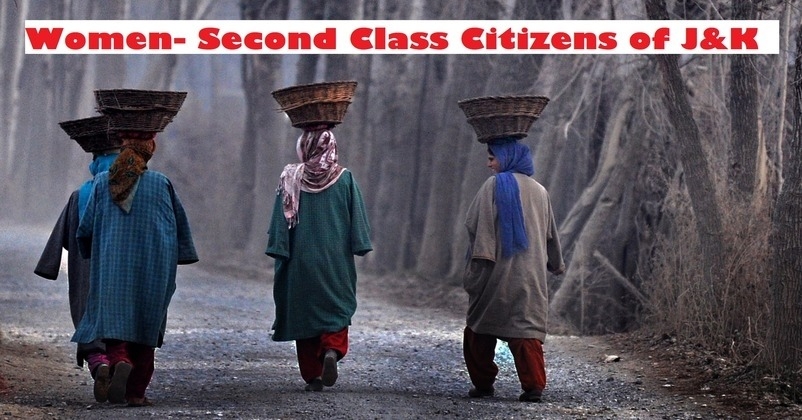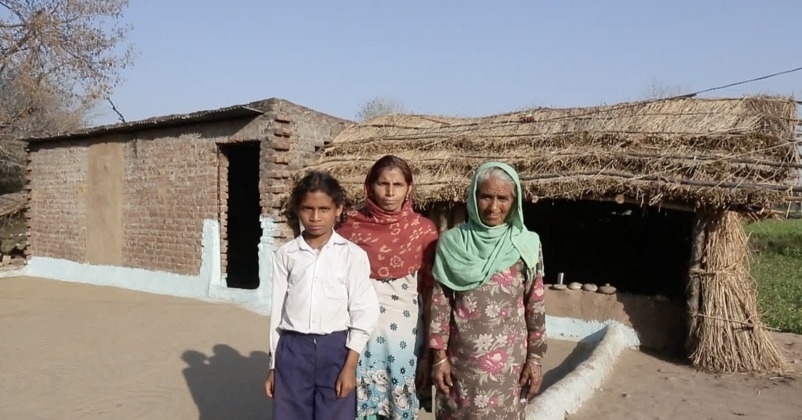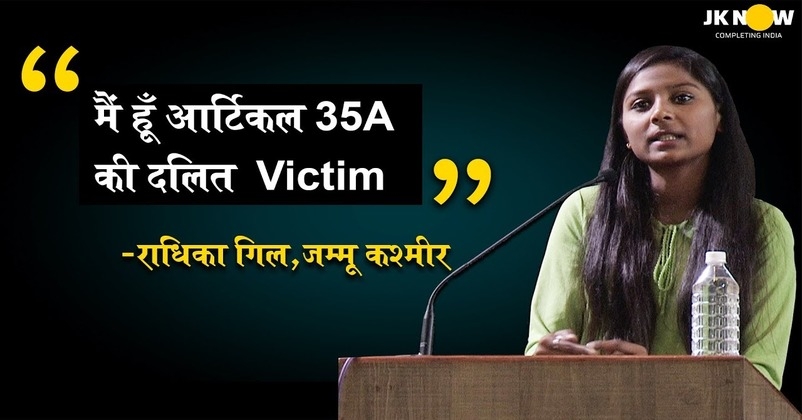Mother plays an important role in shaping the future of her children. She makes a lot many sacrifices to ensure a good education, job, house and a bright future for her children. With the focus of the central government on women empowerment, today’s mother venturing into new fields and exposed to many realities of the world. Essentially, all this makes a mother more equipped to give the best upbringing to her children. But when the entire country is focused on encouraging women, there is one state that ensures a woman is not able to effectively discharge her responsibility, as a mother, towards her children. Jammu and Kashmir (J&K) is that state, where it is ensured that the mothers should not be able to perform their motherly responsibility towards their children and unfortunately it is done by law. Ironically, the state gets the source of such discrimination from an unconstitutional and discriminatory Article (i.e. Article 35A) that was inserted in the Constitution of India secretively. Paradoxically, the discriminatory provision Article 35A was added in Chapter-III of the Constitution that deals with Fundamental Rights and allowed the violation of the fundamental rights.
All this discrimination is done with those women of Jammu and Kashmir, who committed a crime i.e. chosen her life partner out of her free will. This discrimination was done because the Constitution of J&K does not consider that men and women are equal and the erstwhile political leadership became a party of the crime against women. In J&K, the woman has no right to choose her life partner and if a woman dares to marry a man without Permanent Resident Certificate (PRC), irrespective of the fact that whether he is a resident of the state or not, her spouse and children are not conferred the PRC like it is done in the case of male. It sounds weird that in the 21st century, a law, denies a woman the right to marry a man of her choice, but this indeed is the reality in J&K. Today, on the occasion of ‘Mother’s Day’, we will tell you more about this ‘Black Law’, which deprives mothers and the children of their valid rights and compel them to live a life of helplessness and deprivation.
The founding fathers of our constitution would have never imagined that the constitution created conspicuously and with precision, will be abused by one of the states, to such an extent that women will be forced to live the life of second-grade citizens in India. It is the travesty of justice that Article 35A was inserted in the Constitution of India clandestinely and without involving the Parliament, in clear violation to the Constitutional provisions. The Constitution was adopted in 1950. After four years of adoption of the Constitution, a new provision i.e. Article 35A was added, in the Constitution of India, without the knowledge and approval of the parliament. This Article is the worst example of gender bias in our country because constitutional sanction is given to oppress women in a democratic and secular country.
About Article 35A
The provision states that "35-A. Notwithstanding anything contained in this Constitution, no existing law in force in the State of Jammu & Kashmir, and no law hereafter enacted by the Legislature of the State,
(a) defining the classes. of persons who are or shall be, permanent residents of the State of Jammu & Kashmir; or
(b) conferring on such permanent residences any special rights and privileges or imposing upon other persons any restrictions as respects: -
(i) employment under the State Government;
(ii) acquisition of immovable property in the State;
(iii) settlement in the State; or
(iv) right to scholarships and such other forms of aid as the State Government may provide, shall be void on the ground that it is inconsistent with or takes away or abridges any rights conferred on the other citizens of India by any provisions of this part."
Consequently, the non-PRC holders are made ineligible for buying and owning immovable property, education, voting, contesting elections, govt jobs, etc. in the State of J&K whereas no restrictions are being imposed on PRC holders of J&K in any other part of the country.
How article 35 A is against women
In J&K, if a man marries a woman, who is a resident of any other state, or another country, his wife and children born from this marriage will be entitled to all the rights, including buying and owning immovable property, education, voting, contesting elections, govt jobs, etc. On the other hand, if a woman, irrespective of her religion, marries a man, who is a resident of other state or living in Jammu Kashmir, but without a PRC, then her husband and the children born from this marriage, will be deprived of all the rights and privileges of a PRC in the state. The children of such a mother, will not be allowed any rights to education, buying and owning property, govt jobs etc. The height of injustice is that such a woman cannot even give her own property to her children because article 35 A does not give such children any inheritance rights.
Article 35A is a mockery of Indian Constitution
Article 35A was inserted in the constitution fraudulently. Though Article 368 clearly mentions that any addition or deletion in the Constitution can be done only by the parliament yet on 14th May 1954, Article 35A was inserted in the Constitution of India through a Presidential Order without getting it passed from the Parliament.
Ironically, it was placed in Chapter-III of the Constitution that deals with Fundamental Rights and 35A is the only provision which is contradictory to many other provisions of the constitution, including Fundamental Rights. Article 35A violates:
Article 14- Right to Equality
Article 15- No discrimination on the basis of religion, race, caste, gender or place of birth
Article 16- Equality of Opportunity
Article 19 g- to practice any profession, or to carry on any occupation, trade or business.
Article 21- Right to Life and Liberty
Article 39 a- The citizens, men, and women equally, have the right to an adequate means of livelihood
Article 326- Right to vote in Legislative Assembly of states
People’s Representation Act 1951
Kashmir based political parties against Rights of women
Though the Permanent Resident Certificate (Procedure) Rules, 1968 does not disqualify any women on the ground of her marriage to a non-PRC yet disqualification was imposed clandestinely in mid-1960s when then revenue minister issued an executive order and directed all deputy commissioners to issue certificate of permanent resident to women with the proviso 'valid till marriage. The patriarchal mindset of Kashmir, the smallest part of the entire state of J&K, based political parties was responsible for the injustice done to women through this law. Before 2002 the repercussions of article 35 A were more damaging for a woman, who marries a non-PRC because the woman had to forego all her rights, and her PRC is withdrawn, in the state after such marriage. But in Dr. Susheela Sawhney versus State of Jammu and Kashmir case of 2002, the J&K High Court annuls the discriminatory executive order and clearly mentioned that a woman does not lose her PRC even if she marries a non-PRC holder. The full bench of the J&K High Court made it clear that the executive order had no legislative sanction and it violated gender equality clause of the constitution. But the judgment remained silent on the status of children born out of such marriage. Hence, the State working with the patriarchal mindset deprived the children of such women, who have married a non-PRC, from getting the benefits in the state though no written document was available in this regard.
The political parties of Jammu Kashmir could not digest this order and the then ruling party PDP introduced a bill to reverse the order of the High Court. The bill provided that if a woman of J&K marries a non-PRC then she will not be entitled to any rights in the state. This bill was called the “Jammu and Kashmir Permanent Resident Status (Disqualification) Bill 2004’’. This Bill was passed by the Legislative Assembly or the Vidhan Sabha, but it failed to get passed in the Legislative Council or the Vidhan Parishad. Abdullah was so upset with this failure of the Bill in the Legislative Council that the Chairman of the Council, Abdul Rashid Dar, who was also a seated MLC, was expelled from the party. Since then the Bill is pending in the house. The attitude of the ruling class towards women’s rights in the state is a matter of grave concern. The former Chief Minister and also a former Union Cabinet Minister Farooq Abdullah, when questioned on Article 35A and women’s rights, he chose to leave a live debate on a news channel, rather than giving any satisfactory answer. More insensitive was the response of PDP leader Mehbooba Mufti, himself a woman. On the question of 35A and its effect on women, Mufti said ‘If a woman marries outside the state, her rights would end in J&K but on the other hand when a woman comes to the state after marriage, we give her all the rights, so the loss is compensated’

The Women of J&K are no longer ready to accept this discrimination
The women in Jammu Kashmir are finally raising their voice against this discrimination and gender biases that have been inflicted upon them by an unconstitutional provision. They have been protesting against gender discrimination and challenging this unconstitutional provision in the Court of Law. A Dalit girl Radhika Gill, who despite being an excellent athlete could not get a job in J&K has filed a petition in Supreme Court against Article 35A. Another petition challenging Article 35A has been filed in Jammu Kashmir High Court by Renu Nanda, a professor at Jammu University. Her case becomes more relevant on Mother’s Day because through this petition she is fighting for the rights of her two sons, which are snatched by Article 35A.
It is disheartening to see a woman, a mother, moreover a representative of people, responding like this. The behavior of Mufti and other Kashmir based political parties show insensitivity of the ruling class towards the rights of women in the state. Now, the women have challenged this patriarchal and male dominant mindset, which is prevalent in J&K. They have challenged the regressive mentality of the ruling class in the Court of law. On this Mother’s Day, we salute the Mothers and pray that in this fight for equality and justice of the mother in J&K shall be victorious.



